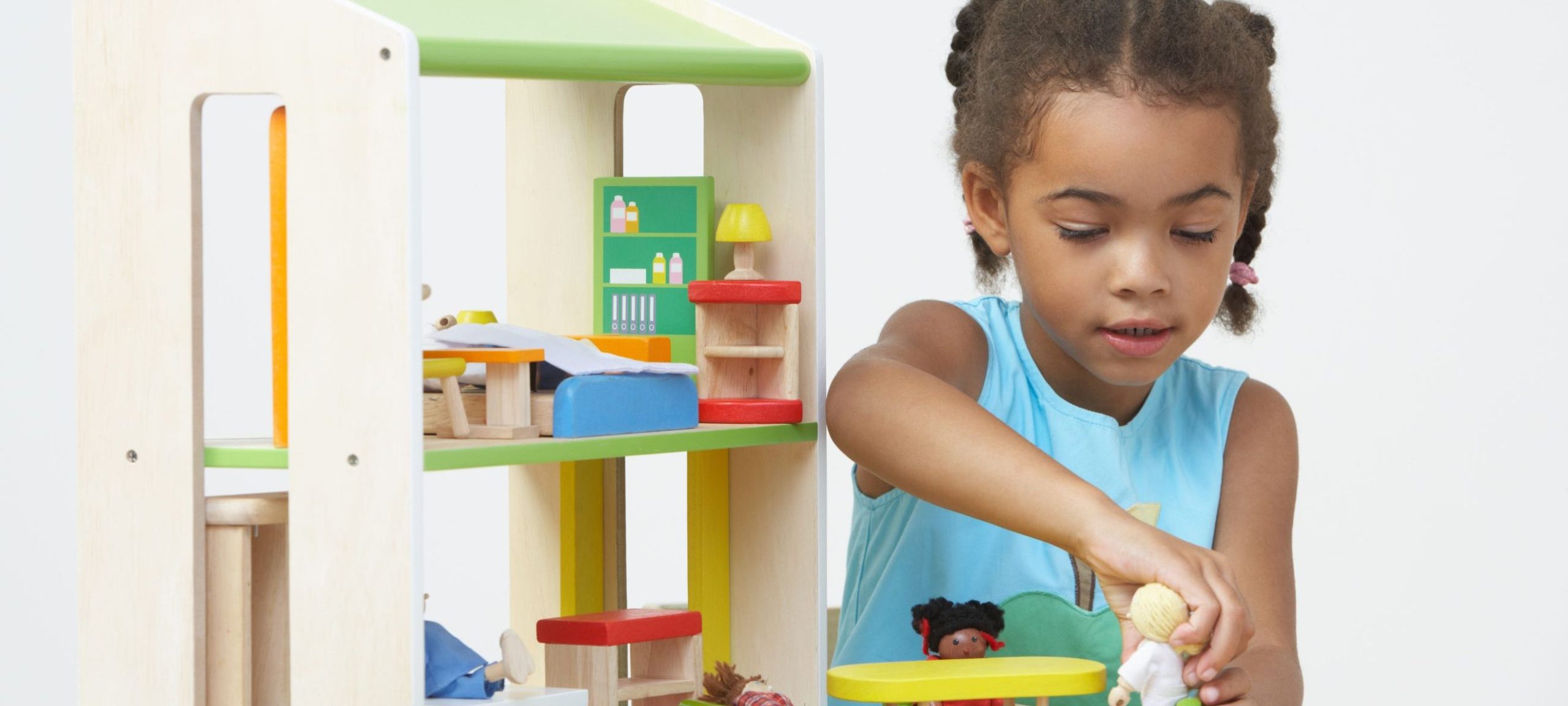
Play is one of the most essential components of positive childhood development. In many ways, playfulness is a child’s natural state. Through play, children learn, grow, develop, and come to understand the world around them. Play is a child’s language, and toys are their words.
On a practical level, play develops physical skills. Children learn dexterity as well as coordination through manipulating toys, by drawing and coloring, when building with blocks, etc. Play is important to healthy brain development. It is through play that children, from a very early age, engage and interact with the world around them.
Play allows children to use their creativity, too. Children are wonderful at imagining things and often spend time in the world of “make believe”. Providing them opportunities to dress up, paint their faces, or don costumes gives them the freedom to explore different experiences and play act at being someone else. This role playing is just one way in which children start to explore adult roles and appreciate the thoughts and feelings of others.
Play also reduces stress and helps your children grow emotionally. Especially during the COVID-19 pandemic, many children are feeling uncertain and insecure because their usual routines have been dramatically disrupted. Play is escapism for children, time when they can simply be joyful and silly. With so many stressors in their environments, play becomes a crucial outlet for fear and worry.
Play During the Pandemic
 At the Center for Child Counseling, we recently welcomed seasoned psychologist Dr. Anne Holland Brown to our team. Anne has more than 26 years of mental/behavioral health experience working with economically-disadvantaged, racially and ethnically diverse populations of children who have experienced child maltreatment and other types of trauma. She answered some questions about the importance of play and Play Therapy.
At the Center for Child Counseling, we recently welcomed seasoned psychologist Dr. Anne Holland Brown to our team. Anne has more than 26 years of mental/behavioral health experience working with economically-disadvantaged, racially and ethnically diverse populations of children who have experienced child maltreatment and other types of trauma. She answered some questions about the importance of play and Play Therapy.
Why is play so important?
Play is essential to all aspects of healthy child development. Play stimulates a child’s cognitive, physical, linguistic, and social-emotional development. Through play, children explore and learn about the world around them, including other people in their world—parents/caregivers, siblings, peers, etc. Play is also a great way for children to express their thoughts, feelings, memories, wants, and needs, especially when they do not have the language to do so effectively.
Are there different types of play?
Yes, play can be solitary or with another party or parties, such as with peers, siblings, or parents/caregivers. Children’s primary modes of play change as they develop, often evolving from more solitary forms of play to more interactive forms of play. Our first play experiences with others are typically with our parents/caregivers, and these playful interactions, such as peek-a-boo, are what help us to form safe, healthy attachments with our parents/caretakers and, in turn, with other individuals as we grow. Playing with others has been found to help children develop a better understanding of the reciprocal nature of relationships and turn taking, as well as an understanding and respecting that people outside of themselves may have different thoughts, feelings, wants, and needs than they have (empathy development).
What’s the difference between structured and unstructured play?
Structured play has set rules and parameters and is often directed by someone/something other than the child. From structured play activities, children can learn very valuable lessons, such as turn taking, cooperation, sharing, and fairness. It is critical, however, that children also be provided with time for unstructured or child-directed play. This type of play has been associated with fostering a child’s creativity, imagination, ability to entertain oneself, and independence.
How is play healthy?
Mental and physical health are inextricably combined. Aside from the vast benefits to the mind, play is essential to the body. Children need to be running, jumping, stretching, and tumbling. Childhood obesity is an epidemic in much of the world due to our increasingly sedentary lifestyles and the lack of opportunity in many places to play outside. Children need to spend time outdoors. Here, they connect with nature, find ever-changing environments to explore, and are free to move about with joyful exuberance!
What about when kids say: “I’m bored”?
Boredom is good for kids because it teaches them to entertain themselves. Children need to learn how to enjoy being alone and find ways to stay amused without constant external stimulation or structure. Free play teaches children to be creative and discover for themselves how to make their own fun – to find what they are good at and what they enjoy.
Are children struggling with isolation right now?
I believe so. Children are by nature social creatures; its challenging for them to have to cope with this level of isolation from friends and classmates. It’s critical that children experience peer interaction; technology like Zoom and Facetime can help with that. Some families have formed “social bubbles” – a limited and controlled group of people with whom their children can safely play, so they can continue to enjoy some level of peer socialization safely. At this time, parents also need to be extra sensitive to the losses that children are feeling, and be open to listening to their children’s concerns, as well as taking time out of each day to play with their child. Parents/caregivers want to make sure that family time isn’t just about home schooling, but that the family is doing playful and fun activities tighter to lessen the stress on everyone.
What’s the difference between play and Play Therapy offered by professional, clinical organizations like Center for Child Counseling?
Play Therapy uses a child’s natural affinity for play to help them process their thoughts, feelings, and memories. Grown-ups tend to think of talk therapy when they think of mental health treatment, but children don’t necessarily have the ability (language skills) or willingness to express themselves in this way. So, in Play Therapy, play replaces verbal communication and allows children express themselves in a way that feels safe and comfortable. At Center for Child Counseling our skilled professional therapists use Play Therapy to help children heal from trauma and work through other challenges/stressors. Through both unstructured and structured play therapy techniques, therapists help children safely share/process information; develop emotional intelligence and emotional regulation skills; learn coping, safety, and self-protection skills; and learn about and practice having safe and healthy relationships with others.
Any final thoughts?
People should not understate the importance and power of play, especially child-directed play. Such play positively impacts every single area of your child’s development and creates a solid foundation for children to grow into happy, healthy, and productive adults.
